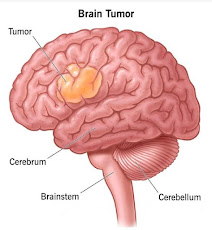Brain Tumor : Complete Description and Diagnosis
Brain Tumor : Complete Description and Diagnosis
Brain tumors are abnormal growths of cells within the brain that can be benign (non-cancerous) or malignant (cancerous). They can develop in various regions of the brain and can have significant impacts on a person's neurological function and overall health. In this article, we provide a comprehensive description of brain tumors, including their types, causes, symptoms, diagnostic methods, and treatment options.
Introduction:
Brain tumors are a complex and diverse group of neoplasms that originate from abnormal cell growth within the brain. They can affect people of all ages, from children to the elderly, and can arise from different cell types in the brain. Understanding brain tumors is crucial for timely diagnosis and effective management.
Types of Brain Tumors:
There are several types of brain tumors classified based on their origin, behavior, and microscopic characteristics. Some common types include meningiomas, gliomas (astrocytomas, oligodendrogliomas, and ependymomas), medulloblastomas, pituitary adenomas, and schwannomas. Each type exhibits unique characteristics, prognosis, and treatment approaches.
Causes and Risk Factors:
The exact causes of brain tumors are not yet fully understood. However, certain risk factors have been identified, including exposure to ionizing radiation, family history of brain tumors, genetic syndromes (such as neurofibromatosis and Li-Fraumeni syndrome), and certain rare inherited conditions. Environmental factors and lifestyle choices may also play a role.
Symptoms and Clinical Presentation:
The symptoms of brain tumors can vary widely depending on the tumor's size, location, and rate of growth. Common symptoms include persistent headaches, seizures, cognitive and personality changes, visual disturbances, motor weakness, balance and coordination problems, nausea, and vomiting. Early recognition of these symptoms is vital for early intervention.
Diagnostic Methods:

Diagnosing brain tumors involves a combination of clinical assessment, neuroimaging techniques, and tissue sampling. Imaging modalities such as magnetic resonance imaging (MRI), computed tomography (CT), and positron emission tomography (PET) scans provide detailed information about the tumor's location, size, and characteristics. Biopsy and histopathological analysis are crucial for determining the tumor's type and grade.
Grading and Staging:
Brain tumors are graded on a scale from I to IV based on their aggressiveness and growth potential. The World Health Organization (WHO) grading system is commonly used to categorize tumors. Staging, on the other hand, describes the extent of the tumor's spread within the brain and nearby structures.
Treatment Options:
The treatment of brain tumors depends on various factors, including the tumor type, location, size, grade, and the patient's overall health. Treatment options may include surgery, radiation therapy, chemotherapy, targeted therapy, immunotherapy, or a combination of these modalities. The goal is to remove or control the tumor while preserving neurological function and improving quality of life.
Prognosis and Survival Rates:
Prognosis and survival rates vary widely depending on the type, grade, and stage of the brain tumor, as well as the individual's age and overall health. Some tumors have a more favorable prognosis, while others are associated with poorer outcomes. Early detection, prompt treatment, and ongoing monitoring are essential for optimizing patient outcomes.
Supportive Care and Rehabilitation:
Patients with brain tumors often require comprehensive supportive care, including symptom management, psychological support, rehabilitation services, and palliative care when necessary. Multidisciplinary care teams comprising neurologists, neurosurgeons, oncologists, radiologists, and supportive care specialists work together to provide holistic care.
Future Directions:
Advancements in research and technology continue to shape the diagnosis and treatment of brain tumors. Novel targeted therapies, immunotherapies, and precision medicine approaches hold promise for improved outcomes and personalized treatment strategies. Ongoing research efforts aim to unravel the underlying molecular mechanisms driving brain tumor development and identify new therapeutic targets.
Conclusion:
Brain tumors present a complex and challenging medical condition, necessitating a multidisciplinary approach for diagnosis and treatment. Early recognition of symptoms, accurate diagnosis, and appropriate management are crucial for optimizing patient outcomes. Advances in research and treatment approaches offer hope for improved survival rates and enhanced quality of life for individuals affected by brain tumors.









Brain Tumor Surgery Cost - Brain tumor surgery is to remove malignant or benign growths in the brain. Utilizing advanced techniques like stereotactic navigation and intraoperative MRI, surgeons strive to excise tumors precisely while preserving surrounding healthy tissue. This critical procedure can alleviate symptoms, provide a pathologic diagnosis, and improve survival rates. Visit: Cost of Neurosurgery
ReplyDeleteBest Medical Tourism Company